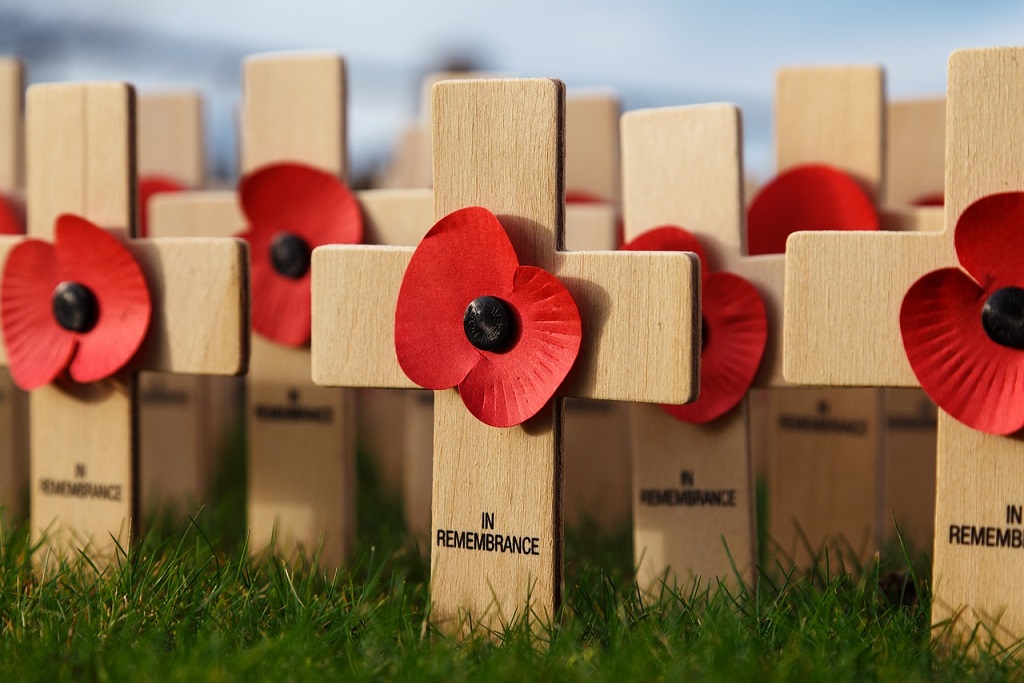At risk of social opprobrium every member of the public wing of the UK BBC staff ―especially presenters and newsreaders and the like― will be compelled to wear a red poppy―the symbol of glorious death or serious injury in defence of the nation.
 Nigel Pocock
Nigel Pocock
War has always been with us, ever since humanity moved from being a gatherer society to a settled society with emotional and economic interest in property to defend.
Amongst the earliest detailed alleged historical accounts are in the Old Testament (Christian) or Hebrew Scriptures (Jewish) ―an horrifying description of genocide, colonisation and lebensraum― of ancient einsatzgruppen (‘operational units’) murdering every man, woman, child, whether old, disabled or otherwise ―all in the name of religious and ethnic purity. Hebrew general Joshua ben Nun (‘salvation’) and the leaders of insurrectionist groups (wherever they are) and, indeed, einsatzgruppe A, B, C, and D?
Common threads run through such movements, then and now. Threads, such as utopianism, deicide, and ‘purity’. These ideological and theocratic ideals justify all! How can we constructively critique and neutralise such ideologies?
When (the then) foreign minister of Israel, Shimon Peres, tried just that in relation to King David’s seduction of Bathsheba and murder of her husband, a man (presumably an Orthodox) had an apoplectic fit, and had to be treated in the parliamentary infirmary (Eric Siebert, 2012).
 King David was very likely the biggest mass killer of all in the Hebrew Scriptures, with around 140,000 deaths to his name.
King David was very likely the biggest mass killer of all in the Hebrew Scriptures, with around 140,000 deaths to his name.
These are people who have been taught to read their culture from ‘inside the ark’ (of Noah), not outside of it. If God (or some other deified human) orders an action, it must be good. The deaths of those outside the ark are thereby not heard.
The screams of drowning children are not heard, much less those of millions of others. As the ‘Man of Steel’ (Stalin) commented, they are a statistic, not a tragedy. Such cries are neutralised. Only the glorious victory of the Pure Ones is celebrated.
How are we to critique effectively? Like Minister Peres―it should be, ideally, from within the ark. For Jews and Christians (and other groups), racial and alleged spiritual purity is critiqued by an internal dialogue even within the ancient text itself.
 For example, the Moabitess, Ruth, becomes part of Israel, neutralising racial purity. The prophet Jonah is sent to show God’s concern for the Nazis of his day, the Assyrians, and there are many others, such as the non-Jewish females of socially and religiously doubtful repute in Matthew’s genealogy at the beginning of his Gospel.
For example, the Moabitess, Ruth, becomes part of Israel, neutralising racial purity. The prophet Jonah is sent to show God’s concern for the Nazis of his day, the Assyrians, and there are many others, such as the non-Jewish females of socially and religiously doubtful repute in Matthew’s genealogy at the beginning of his Gospel.
For Christians, who follow the same ‘within the ark’ reverence for the Hebrew conquest and genocide, could not the critique be even stronger, if only they would heed it? For the very Jewish Prophet (His Name also means ‘salvation’) that they profess to worship, rejected this violence uncompromisingly. Did He not say that the way was one of love of enemies, of peacemaking, blessing for the poor, of the gentleness of the humble and merciful? What a conceit! How this presumption enraged His enemies!
Yet this critique neutralised his foes, especially when He refused to support the capital punishment of the woman taken in adultery, pointing out that only a sinless person could rightfully condemn her! This is to critique all ideologies of violence.
Less we think this is irrelevant because belonging to another culture and time, this is not so. Human nature has not changed. The commonality across time and culture is greater than the differences, as numerous observers have recognised.
 Thus is the ideology of hatred critiqued from the inside, by a Jew who was judicially murdered (‘pacified’) by the Roman state, and ideologically by the religio-political opposition, a ‘political religion’ indeed, with its ideology of divinely-approved genocide.
Thus is the ideology of hatred critiqued from the inside, by a Jew who was judicially murdered (‘pacified’) by the Roman state, and ideologically by the religio-political opposition, a ‘political religion’ indeed, with its ideology of divinely-approved genocide.
Whoever the violent leader is, then and now, they, and more, are called to account to do the one thing they do not want to do. To repent of their evil deeds.
This should be the glory of remembrance, not a spiral of violence, which is quite literally, destroying the world.
(Photos: Pixabay)












.jpg)












